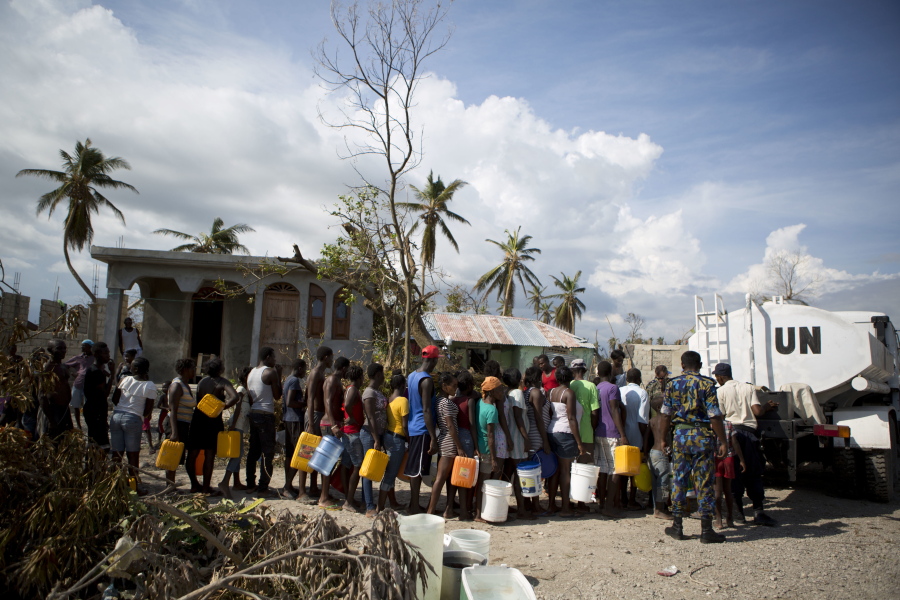LES CAYES, Haiti — People throughout Haiti’s devastated southwest peninsula formed makeshift brigades Tuesday to clear debris and try to regain some semblance of their pre-hurricane lives as anger grew over the delay in aid for remote communities more than a week after the Category 4 storm.
A community group that formed in the southern community of Les Anglais began clearing tree limbs from streets and placing them into piles while others gathered scraps of wood to start rebuilding homes destroyed by Hurricane Matthew.
Carpenter James Nassau donned a white construction helmet as he rebuilt a neighbor’s wall with recycled wood, hoping to earn a little money to take care of 10 children, including those left behind by his brother, who died in the storm.
“My brother left five kids, and now I’ve got to take care of them,” he said.
The scene repeated itself across seaside and mountain villages dotting the peninsula, where people pointed out helicopters buzzing overhead and questioned why they haven’t received any help.
Israel Banissa, a carpenter who lives near the stown of Moron, said a Red Cross assessment team stopped outside his village to ask people questions but didn’t leave any supplies.
“There’s no aid that’s come here,” he said as he sawed wood to help rebuild his home and dozens of others. “I don’t think they care about the people up here.”
The U.N. humanitarian agency in Geneva has made an emergency appeal for nearly $120 million in aid, saying about 750,000 people in southwest Haiti alone will need “life-saving assistance and protection” in the next three months. U.N. officials said earlier that at least 1.4 million people across the region need assistance and that 2.1 million overall have been affected by the hurricane. Some 175,500 people remain in shelters.
The National Civil Protection headquarters in Port-au-Prince raised the official nationwide death toll to 473, which included at least 244 deaths in Grand-Anse. But local officials have said the toll in Grand-Anse tops 500.
Those who survived the storm still faced great challenges, including going days without food.
Elancie Moise, an agronomist and director for the Department of Agriculture in southern Haiti, said between 80 to 100 percent of crops have been lost across the southern peninsula.
“Crisis is not the word to describe it,” he said. “You need a stronger word. It is much worse. There is no food for people to eat.”
Food was slowly reaching remote communities, but there was also a growing need for medical supplies.
In the village of Dame Marie, 300 patients with festering wounds lay silently on beds at the main hospital waiting for medicine a week after the storm hit.
Among them was Beauvoir Luckner, a cobbler and farmer who walked seven miles in three days after a tree fell on his house, crushing his leg and killing his mother. The leg might have to be amputated, but all doctors can do is clean his wounds because the hospital has run out of everything, including painkillers.
“There’s no water, no antibiotics,” Dr. Herby Jean told The Associated Press. “Everything is depleted. …We hear helicopters flying overhead, but we’re not getting anything.”
Concern also was growing about an increase in cases of cholera, which has already killed roughly 10,000 people and sickened more than 800,000 since 2010.



